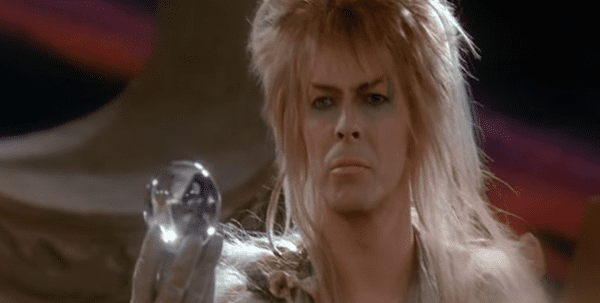
Introduction
Oh you’ve turned my world, you precious thing…
These haunting words reverberated through my mind upon learning, two weeks ago, of David Bowie’s death. A great number of people feel his loss in the world of music, but I didn’t know him best as a musician. I knew him as Jareth, the compelling, charismatic Goblin King from the 80s cult classic, Labyrinth.
I felt a wave of nostalgia wash over me as the loss of my favorite childhood villain began to sink in. And then I wondered if it might be possible to write a mimetic analysis of Labyrinth in honor of David Bowie. Admittedly, when the thought occurred, I had not yet pondered any sort of in-depth analysis. I was simply looking forward to my “research” (that is, watching the movie and singing and dancing along to all of the songs.)
Yet even before my research began, as I started to contemplate the story and the characters, I had to wonder if filmmaker Jim Henson was a closet Girardian himself! Labyrinth is ripe for mimetic analysis, beginning with a scapegoating sacrifice and culminating in a reorientation of desire. Between these extremes is the labyrinth itself – an arduous, winding physical and spiritual journey during which circumstances, priorities, and values are subconsciously reevaluated and new meaning is discovered.
And it has only been through the lens of mimetic theory that I have come to fully understand and appreciate the magnitude of David Bowie’s character. He is not merely a magnetic, enigmatic and striking villain; he is Satan himself! True, mimetic theory does not accede to a personal view of “the satan.” But if the principal of accusation, deceit, and twisted desire had a face, it would be Jareth’s. It feels a little odd to “honor” someone by naming him as the embodiment of all evil. David Bowie, after all, was not the devil… but he played one wickedly well.
Sacrifice and the World of the Satan
Labyrinth begins with a sacrifice. Our heroine, Sarah, is in the midst of a personal crisis, augmented, no doubt, by teenage hormones, but genuine. After the opening scene foreshadowing her epic showdown with the Goblin King, we can imply from visual clues that her mother has died. Perhaps this has kept her in a semi-fantasy state of mind. Her room is filled with stuffed animals, the books on her desk are classic children’s fantasies, and she seems to prefer to escape to a world of make-believe.
Were she merely role-playing, there may not be much cause for concern, but Sarah soon proves herself not merely childlike, but, to a degree, childish. Upon discovering that one of her stuffed animals has been used to comfort her little brother, Toby, she storms into the infant’s room screaming, “I hate you! I hate you!” Clearly, the child is innocent. But Sarah scapegoats the poor baby for far more than being caught with her toy. This child is a sign that her father, grieved though he may be from the loss of Sarah’s mother, is moving forward in his life. He has remarried, and the new baby has cemented a familial bond that Sarah resists. She resents her stepmother, resents her half-brother, and seems to wish to revert to an earlier time when she was an only child, before her mother’s death. She longs for love, perhaps unable to see the love she already possesses. Little of this is consciously acknowledged, however, and on first viewing, Sarah seems only concerned about her loss of freedom as she must babysit a child while her parents go out. Hyperbolically, Sarah fancies herself a modern Cinderella and cries out for rescue. Though she exaggerates, there is real pain behind her melodramatic façade. All the same, she clearly scapegoats her brother Toby, and in the end, sacrifices him, if accidentally, to the Goblin King by wishing him away. “I wish the goblins would come and take you away,” she says to her screaming brother. “Right now.”
An instant later, Toby is gone, and the Goblin King arrives in a flash of evil glory. When Sarah begs for her brother back, he patronizes her, then bribes her with her “dreams,” before whisking her away to his underground world where his castle beyond the Goblin City lies at the end of a vast, foreboding labyrinth. Sarah has 13 hours in which to solve the labyrinth before her baby brother becomes a goblin forever.
Simultaneously condescending and tempting, manipulative, deceitful, and magnetically attractive, Jareth indeed embodies a very particular form of evil: the satanic principal. He feeds off of scapegoating sacrifice, as seen by his desire for Toby. Yet his wickedness is disguised by a false benevolence. He is Sarah’s dream and her nightmare, offering to liberate her a life she cannot tolerate by relieving her of her responsibility for her brother, yet capturing her in a lie. Because the lines between fantasy and reality are so blurred in Labyrinth, it is hard to say definitively when he began to manipulate Sarah, whether or not their worlds collided before he stole Toby. But I imagine him whispering through the pages of her storybook (the story she acts out in the beginning and must live out in the end), compelling her to believe that he loves her and wants to rescue her from the bane of her existence, whom he helps her identify as Toby. If only Toby were taken away, he urges, all her problems would be solved.
That is, of course, exactly the way scapegoating works. People come to believe that their problems will be solved if they could only get rid of someone. The satanic principal is the principal of accusation and blame, the lie that a person or a community can only experience peace, success, fortune or joy at the expense of someone else. It has manifested in all kinds of violence, from expulsion to murder to oppression to war. The human propensity to project blame onto another and deflect one’s own responsibility is so deeply embedded within our psyche that there is no need for a “personal” satan. In fact, to accuse someone of being the embodiment of Satan is to employ the satanic principal one’s self.
Yet in this fantasy, Jareth, the Goblin King, is the demand for sacrifice come to life, the embodiment of Satan. He clearly feeds off of receiving those who have been thrown away, cast out by society, as Sarah has cast out Toby. He stops at nothing to ensure that Sarah does not reach her brother. This includes attempts at physical harm as well as psychological manipulation. He strives to reorient her desires toward himself and away from her sisterly love (which, hidden under a mess of trauma, angst, and deception, surfaces like a nearly-drowned victim gasping for air as soon as the fantasy to rid herself of Toby becomes a reality). The twisting of desire away from harmonious connection with others toward self-fulfillment at another’s expense is yet another manifestation of the satanic principal, which builds identity over and against another. Jareth seeks to deceive Sarah into loving him at the expense of her brother. But real love calls instead for mercy, not sacrifice.
Love Robs the Devil of Its Power
In spite of all of his manipulation, in spite of attempts to impede Sarah with obstacles, disorient her and undo all of her progress, or trap her in a false paradise of her dreams, Jareth cannot hinder Sarah, who is propelled forward by love. It is not only the love of her brother that motivates her. Along her journey, Sarah encounters three creatures who are clearly outcasts. Hoggle is a dwarf with no friends who ostensibly works for Jareth, though only out of fear, not loyalty. Ludo is a beast – intimidating on the surface but with a heart of gold – being tortured in captivity when Sarah takes the risk of rescuing him. And Sir Didymus is a talking raccoon who lives on the shores of the Bog of Eternal Stench, clearly beyond the margins of any “decent” society. Sarah befriends them all. In a world of outcasts under the power of the devil, Sarah manages to find and give love. No wonder she “turned [Jareth’s] world.”
One must wonder if Jareth finds the befriending of outcasts as intolerable as the thought of rescuing, or unsacrificing, Toby. If Jareth’s power lies in deceiving others into believing in the need for sacrifice, dividing creatures against each other, or building a kingdom out of controlling the rejected, then it seems that this is the case. In particular, Sarah’s friendship with Hoggle infuriates Jareth. In his threatening, manipulative fashion, Jareth seeks to breed self-contempt in Hoggle to keep him from believing he could ever be valued by anyone. “You don’t think a young girl could ever like a repulsive little scab like you, do you?” he asks. One of the devil’s tricks is convincing the victim of his or her own guilt or insignificance. For a long time, such manipulation has worked to intimidate Hoggle, but Sarah’s friendship empowers him. Hoggle’s character arc is in many ways the most compelling of the entire movie, but that is beyond the scope of this essay. For now it is simply worth reflecting on how his relationship with Jareth brings to light the ways in which blame and accusation can deceive people into the lie of self-worthlessness, making it that much easier to harm others or acquiesce to harm of one’s self. Jareth makes Hoggle feel worthless and compels selfishness. Yet Sarah helps Hoggle find his sense of worth, and thus enables his selflessness.
In the end, Sarah’s friendships become a part of her. Though she must face Jareth “alone,” as interdividuals we are never alone. Sarah takes the love of her friends to her final confrontation with Jareth. In this stunning scene of magnificent mimetic proportions, we not only see Sarah stronger for having embraced the love of others, but we also see Jareth admit to being formed by Sarah’s desires as well. In a succinct monologue, Jareth details how he has lived up to the compelling and formidable villain of Sarah’s fantasies. “I am exhausted from living up to your expectations of me,” he concludes. “Isn’t that generous?” His speech is a manipulative blend of truth and deception; truth, for indeed, mimetic theory illumines to us how our formation of identity over and against others creates enemies. Sarah had fantasized herself as a hero in contrast to the villain that Jareth lived into. Yet Jareth is also deceitful, for he evades responsibility for his actions by, again, accusing Sarah of being the reason for his anguish and ignoring the hell he has put her through. Yet Sarah has come through hell stronger, and rather than let herself be intimidated or angered, rather than speak in her own defense, she remains focused on her mission to rescue her brother.
If there is any doubt that Jareth is Satan, it should be laid to rest in his final scene, which is reminiscent to Christ’s temptation in the desert. In his last attempt to win Sarah over, Jareth once again offers her everything she once desired:
I ask for so little. Just let me rule you. And you can have anything that you want. Just fear me, love me, do as I say and I will be your slave.
His request is so reasonable. Just live within the confines of the world he has created, a world of sacrifice and outcasts, and he can be generous. Keep the focus on your own desires, Jareth implies, and he can fulfill them… at the expense of everyone else. “Do as I say and I will be your slave” is a perfect encapsulation of the satanic temptation. When we wield the power of accusation and deceit, when we run the world on sacrifice, expulsion and murder, we may acquire our desires, but we do not rule our desires. In such a world, desire rules over us. Even when the satan works for us, we are slaves to it.
Sarah can no longer be held in the thrall of the satan. The world he controls, the “love” he offers and demands, is false. She knows that now, because she has come to know and be capable of true love, self-giving love, through embracing and being embraced by outcasts (as she herself had been, not only in the Labyrinth, but in her (mis)understanding of her “real” life) and through her recognition of her brother’s innocence and vulnerability. Jareth may offer everything she once desired, but her desires have been reoriented by love. Thus she can truthfully proclaim to him: “You have no power over me!”
Conclusion
Sarah “turned Jareth’s world,” as surely as Christ turned the world under the control of the satanic principal. She brought out the love that was there all along, and discovered it within herself. Whether the labyrinth and the underground world were “real” or inside her mind (but why on earth should that mean it is not real?), Sarah found love within it that she could carry with her for the rest of her life. Even in the depths of hell, the outer margins where we cast the victims we see as monsters, there is love. Sarah demonized her little brother and cast him out, to a hellish world where he was destined to become a monster, but recognizing his innocence and discovering a courageous love within herself, she not only pulled him from the brink, but brought others out of their misery and loneliness along the way, redeeming herself in the service of others.
And what of Jareth, the Goblin King, the satan? I hope if David Bowie looks down upon this tribute from Heaven, he takes no offense at being called out as Satan. I hope he is amused and honored. After all, if you’re going to play the Big Bad, you might as well play the Biggest Bad!
Yet I also believe that even Jareth can be redeemed, by the same love that Sarah discovered and magnified. It may take an eternity, but Love redeems all. Labyrinth, the Gospel in Muppet Form, tells that quintessential truth, in a way we can all dance to.
Rest in Peace, David Bowie, you devil you.















